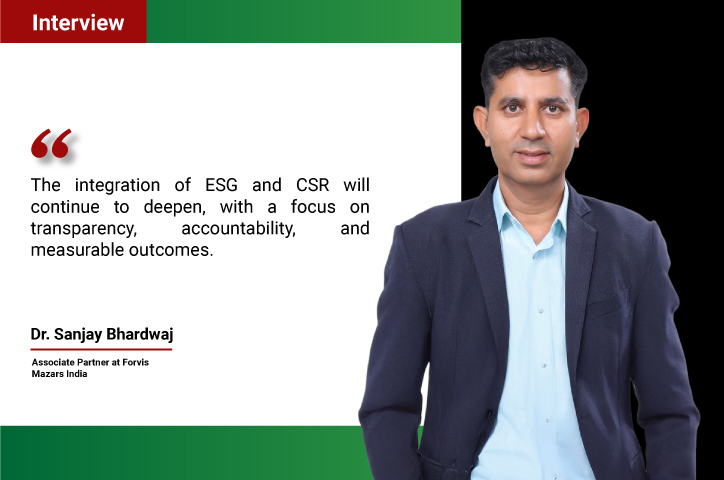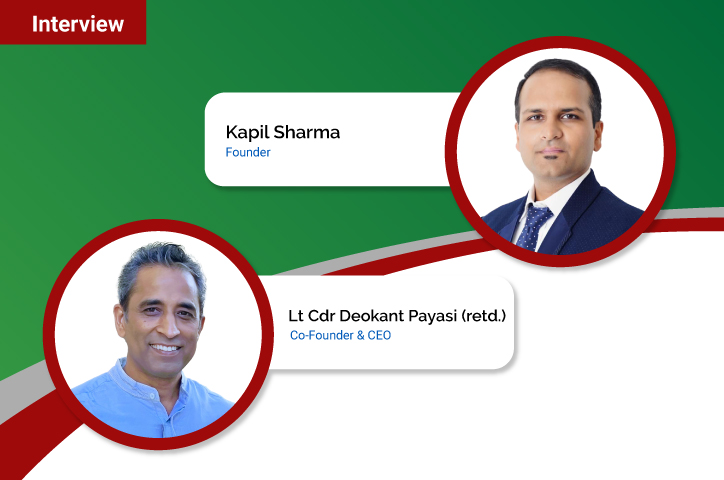In today’s dynamic business environment, responsible growth is no longer a choice—it’s a necessity. As environmental, social, and governance (ESG) standards gain ground globally, companies are seeking to integrate these principles more deeply with their Corporate Social Responsibility (CSR) efforts. But what does this convergence mean in practical terms? How can businesses go beyond compliance to create lasting social and environmental value?
In this exclusive interaction with TheCSRUniverse, Dr. Sanjay Bhardwaj, Associate Partner at Forvis Mazars India, shares his expert insights on how ESG and CSR are merging into a unified strategy for sustainable business. He explores how organizations can align their CSR initiatives with ESG metrics, the challenges they face in operationalizing this integration, and the role of corporate-NGO partnerships in delivering scalable, purpose-led impact. The conversation also highlights real-world examples, success factors for collaboration, and emerging trends shaping the future of social investment. Whether you’re a business leader, development practitioner, or sustainability advocate, this interview offers practical direction and thought leadership to guide the next phase of responsible business strategy.
Q&A
Q. “ESG and CSR” are often seen as parallel yet distinct frameworks. How do you view the convergence of these two approaches in the current global and Indian business context?
A. ESG and CSR have traditionally been viewed as separate approaches, with CSR focusing on social initiatives and ESG emphasizing measurable standards for sustainable business. However, both are increasingly converging as companies recognize that responsible business practices require both compliance and genuine social impact. In India and globally, businesses are integrating ESG principles into their CSR strategies to address regulatory requirements and stakeholder expectations, making sustainability a core part of their operations rather than just an add-on.
Q. In your opinion, how can companies strategically align ESG metrics with their CSR goals to deliver both regulatory compliance and real social value?
A. Companies can align ESG metrics with their CSR goals by identifying overlapping areas, such as environmental protection, social welfare, and ethical governance. By setting clear, measurable targets that satisfy both regulatory frameworks and societal needs, businesses can ensure that their CSR activities contribute to broader ESG objectives. This strategic alignment helps organizations not only comply with laws but also create meaningful social value, improving their reputation and stakeholder trust.
Q. What are the biggest challenges you observe when companies try to operationalize ESG within their CSR programs? How can these be overcome?
A. One of the biggest challenges is translating broad ESG guidelines into actionable CSR initiatives that deliver tangible results. Companies often struggle with data collection, impact measurement, and integrating ESG thinking into everyday business decisions. These challenges can be overcome by investing in concurrent monitoring systems, training employees, and nurturing a culture that values long-term sustainability over short-term gains.
Q. Could you share any examples where this alignment of ESG and CSR has resulted in enhanced impact—either environmental or social?
A. When ESG and CSR are aligned, companies often see greater impact. For example, a business that sets clear environmental goals as part of its CSR program—such as reducing carbon emissions or improving water efficiency—can achieve both regulatory compliance and real environmental benefits. Similarly, focusing on diversity and inclusion can improve workplace culture while meeting social governance standards, leading to positive outcomes for both the company and the community.
Q. The future of CSR seems to lie in collaboration. How do you see partnerships between corporates and NGOs evolving beyond grant-based models into long-term strategic alliances?
A. The future of CSR is moving beyond one-time grants to more strategic, long-term partnerships with NGOs. Companies are increasingly collaborating with NGOs to design and implement programs that address the root causes of social issues, share knowledge, and leverage each other's strengths. These alliances are becoming more integrated, with shared goals, joint accountability, and a focus on sustainable impact.
Q. What are some key success factors for building effective, trust-based collaborations with implementation partners on the ground?
A. Building trust-based collaborations requires open communication, mutual respect, and clear roles and responsibilities. Success also depends on aligning values, setting common objectives, and maintaining transparency throughout the partnership. Regular monitoring, feedback, and flexibility to adapt to changing circumstances further strengthen these relationships.
Q. How is Forvis Mazars advising clients to shift from short-term philanthropic CSR to long-term, purpose-led CSR aligned with ESG principles?
A. Forvis Mazars advises clients to move away from short-term philanthropy and embrace long-term, purpose-driven CSR aligned with ESG principles. This involves helping clients identify their core values, set measurable sustainability goals, and integrate ESG considerations into their business strategies. The firm supports clients in designing programs that not only fulfill legal requirements but also create lasting positive change.
Q. Can you tell us about any ongoing collaborations your firm or clients are engaged in with NGOs or community organizations, and how those partnerships have enhanced overall CSR/ESG outcomes?
A. Our firm and clients are actively engaged in partnerships with NGOs and community groups to deliver impactful CSR and ESG outcomes. These collaborations have led to improved project implementation, better community engagement, and more sustainable results. By working closely with local partners, we ensure that initiatives are tailored to real needs and have a lasting effect.
Q. Looking ahead, what trends do you foresee shaping the next phase of ESG-CSR integration and collaborative social investment?
A. Looking ahead, we expect increased emphasis on data-driven decision-making, greater stakeholder involvement, and the use of technology to track and report impact. Collaborative social investment, where multiple organizations pool resources for larger-scale projects, is likely to become more common. Overall, the integration of ESG and CSR will continue to deepen, with a focus on transparency, accountability, and measurable outcomes.


















.jpg)


